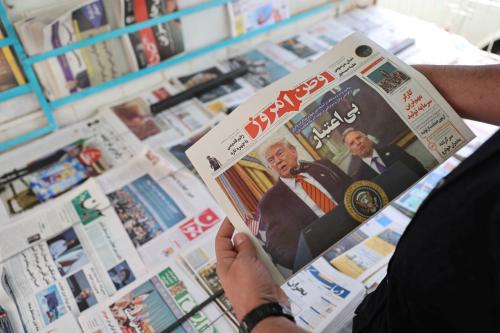On June 12, Israel carried out a series of airstrikes in Iran targeting the country’s nuclear sites. The surprise attack was followed by several days of Israel and Iran trading deadly strikes. Below, Brookings scholars examine the implications of the attack for the region and beyond.
Israel’s strike and America’s choice
For anyone seeking evidence that the world is going through a historic inflection point, the summer of 2025 will have plenty to offer.
Israel’s strikes to decapitate Iran’s military leadership and degrade its nuclear program—launched only days before the sixth round of negotiations between Washington and Tehran—have been an extraordinary initial success. Through coordinated operations, the Israeli military neutralized Iran’s air defense, established air superiority, eliminated top Iranian generals and nuclear scientists, and struck hundreds of targets, including Iran’s key enrichment facilities at Natanz and Fordow.
Not surprisingly, the Trump administration’s tone has quickly changed from Secretary of State Marco Rubio’s initial remarks about Israel acting unilaterally (“We are not involved in strikes against Iran”) to President Donald Trump bragging about having prior knowledge of the operation and U.S. weapons used.
But the real question is whether Trump will go beyond rhetoric and formally join Israel’s war on Iran.
While Operation Rising Lion has burnished Israel’s credentials as the regional hegemon, it has not achieved the destruction of Iran’s nuclear program. Reports suggest much of the enrichment activity in Fordow remains intact—and Tehran will likely accelerate its program once hostilities cease. To achieve the goal of substantially downgrading Iran’s nuclear capacity, Israel needs advanced U.S. weapons and possibly air support in destroying layers of the underground installations at Fordow.
Therein lies the legacy-defining challenge for Trump, the man who ran on ending wars but has made little progress toward peace in Ukraine, Gaza, or elsewhere. Will the United States revert to its traditional role as the region’s hegemon and sheriff, and allow itself to get sucked into another Middle East war? Or will Trump listen to the restrainers in his “America First” coalition and maintain some distance from this fight?
Trump is undoubtedly torn between his restrainer instincts, warning him that direct U.S. engagement in a war with Iran could have devastating consequences for the United States and its allies, and Israel’s push to finish the job. His choice is anyone’s guess but will determine how the next chapter in world history is written.
Military means alone won’t eliminate Iran’s nuclear program
In the initial phases of their campaign, the Israelis have done significant damage to Iran’s nuclear program. But eliminating that program would require much more in subsequent phases, including severely damaging or destroying the deeply buried Fordow enrichment facility. Unless the Israelis can devise novel ways of incapacitating that facility or persuade President Donald Trump to destroy it using a massive U.S. earth-penetrating bomb unavailable to them, Fordow will be a major deficiency in Israel’s war aims.
Even if Fordow and other critical facilities could be destroyed, most experts believe Iran could reconstitute its nuclear program in a year or two and would likely do so at secret locations, having evicted inspectors from the International Atomic Energy Agency—requiring repeated attacks for the indefinite future.
Israeli National Security Advisor Tzachi Hanegbi said on Friday that military strikes alone won’t be able to totally destroy Iran’s nuclear program and that Israel’s goal is to pressure Iran into agreeing to completely dismantle its program. Trump has also expressed the hope that the military campaign will force Iran to come to the negotiating table and accept zero enrichment. But hopes for Iran abandoning its nuclear program underestimate its resilience and attachment to its enrichment program and ignore that Israel’s attack will strengthen, not weaken, its desire for nuclear weapons.
Israelis probably understand this—which is why they regard regime change as the most promising means of ending the Iranian nuclear threat and why it is a thinly-veiled goal of their campaign. But regime change is difficult to engineer. And there’s no guarantee that a successor regime, perhaps led by the Islamic Revolutionary Guard Corps, will be less interested in nuclear weapons than the current one.
Israel has mastered clandestine operations
Whether or not Israel’s attack on Iran accomplishes Tel Aviv’s strategic objectives, the initial strikes show once again Israel’s mastery of clandestine operations. Like its stunning decapitation of Hezbollah’s leaders by exploding walkie-talkies in September 2024, Israel was once again able to identify and track the location of key Iranian military leaders, including the head of the Islamic Revolutionary Guard Corps, Hossein Salami, who was killed, and this time, also smuggle drones deep into Iran for a range of attacks. The latter likely required an extended presence of Israel’s operatives in Iran, a feat all the greater since one would have expected Iran to significantly improve its counterintelligence after the Hezbollah decapitation and after the political chief of Hamas, Ismail Haniyeh, was killed by Israel in July 2024—in Tehran, no less.
The persisting weakness of Iran’s counterintelligence will hamper its ability to rebuild its proxy militias, such as Hezbollah in Lebanon and the Houthis in Yemen, whom Israel is now also hitting. In addition to Iran’s depleted resources and its focus on internal rebuilding, the glamour of Iran’s support for militia forces across the Middle East is badly damaged. This provides opportunities to politically, economically, and institutionally attempt to weaken Iran-supported militias in Iraq.
Iran may well resort to more assassination attempts of its own—such as against Israeli targets, perhaps outside of Israel. It has attempted to assassinate Iranian political dissidents, such as in New York and Europe, as well as former U.S. government officials. While these attacks have caused grave damage to their victims even when they fail, since the targets have their lives dramatically disrupted for a long time, and sap targeted countries’ counterintelligence and law enforcement resources, the Iranian clandestine operations have been often unsuccessful. Iran has frequently relied on rather incompetent criminals (sometimes not even criminal groups) and failed to detect sting operations by law enforcement.
Netanyahu is becoming a liability for Trump
President Donald Trump had campaigned on a promise to end all wars, particularly the wars in Ukraine and Gaza. Yet today, each continues to escalate. Israel’s attack on Iran undermines Trump’s claim to be a peacemaker and his assertion that wars would never have started under his leadership.
Although Secretary of State Marco Rubio had attempted to paint the strikes as a unilateral Israeli decision, the choice to move U.S. Embassy staff and military families out of harm’s way was in effect a green light. Trump’s claim that “we knew everything,” and that the attack occurred because his 60-day ultimatum to Iran expired, likewise suggests a level of coordination. Israel, for its part, claimed the United States provided intelligence, defense against Iranian retaliation, and bunker-buster bombs earlier this year.
This level of involvement in Israel’s war with Iran puts Trump in a difficult position. He had wanted a deal to solidify his image as a peacemaker and perhaps win himself a Nobel Peace Prize one day. Instead, negotiations with Iran have been suspended. While Iran may eventually rejoin, it will do so with even less trust in the United States and Israel than before, making a deal even more difficult to reach.
Finally, Israel’s attack has amplified divisions among Republicans, with Iran hawks like Lindsey Graham urging the United States to “fly with Israel,” and America First folks like Tucker Carlson urging the United States to “drop Israel.” The longer the conflict continues, the more likely Trump is to lose one side of his base.
Flipping the script on global oil markets
The global oil market has experienced whiplash-inducing events over the last two weeks. On May 31, the members of OPEC+ (a coalition of OPEC members and other large oil producers that formed in 2016) announced the latest in a series of production quota increases. Oil prices looked to be headed downward, and markets were well supplied.
A lot can change overnight. Israel’s military strikes initially focused on Iran’s nuclear program, but on June 14, they included an oil refinery and production and processing facilities for South Pars, the world’s largest natural gas field. The global benchmark Brent Crude oil price jumped 7% on June 13, the day after the attacks began, and a further 0.5% on the morning of June 16.
Concern falls into two categories. First, Iran is today the world’s ninth-largest oil producer, despite international sanctions. Spare oil production capacity in OPEC+ is roughly equal to Iran’s production, so a large disruption in Iranian production would leave supply very precarious.
The greater concern is that Iran controls the Strait of Hormuz, a global chokepoint through which about 20% of global oil shipments pass. Closure of the strait or significantly disrupted oil shipments could bring about a global energy crisis and pull the other Gulf oil producers, who would see their shipments and revenues disrupted, into the conflict. Houthi actions in the Red Sea demonstrated that a few strikes on strategic targets can have outsized effects on global commerce. A complete blockade would not be necessary for Iran to make its point.
The Arab world’s Israel problem
In recent years, an Arab-led regional security order was beginning to take shape in the Middle East. Conflicts and competition that flared in the aftermath of mass protests in 2011 were slowly giving way to accommodation, compromise, and diplomacy. Led by Saudi Arabia, Qatar, and the United Arab Emirates, this new security order hoped to stabilize the region by offering the prospect of economic and political integration to historic adversaries, bridging divides between Gulf states and Iran, on the one hand, and between Israel and Gulf states, on the other hand. Since October 7, 2023, however, Israel has moved aggressively and unilaterally to impose its own expansionist vision of a regional security order, devastating Gaza, destroying Hezbollah’s military capacity, enabling the overthrow of the Assad regime in Syria, and now attacking Iran directly based on yet unverified claims of an imminent Iranian nuclear threat.
Arab governments have publicly criticized Israel’s attack, though many quietly applaud the weakening of Iran and its proxies. It is also probable, however, that they are deeply unsettled to see their diplomatic investments shredded by Israel’s attack, and, in the longer term, by the prospect that their own security is now subject to an Israel determined to impose its own vision of regional order by force of arms. Balancing against an empowered and aggressive Israel is likely to emerge as a leading priority of Arab governments in the coming period, even as they take steps to respond to the potential fallout of Israel’s attacks, including the risk of conflict spillover should Iran target U.S. forces in the Gulf and the very real possibility that Iran will now accelerate its development of nuclear weapons.
Israel’s attack leaves Iran with a choice
For three decades or so, policymakers traded worries over the progress of Iran’s nuclear program and the potential of an Israeli military attack on it. Last week, hours after the International Atomic Energy Agency’s board of governors censured Iran—for the first time in two decades—because of its failure to comply with nuclear commitments, the inevitable occurred. The United States and Israel—sometimes alone, sometimes together, and often working with the international community—had employed a wide range of tools to delay an Israeli attack, including diplomacy, targeted killings, economic sanctions, and supply chain disruptions, which bought both parties time. Nevertheless, Israeli concerns about Iran’s intentions and progress were ultimately channeled into military force.
This conflict will be studied long and hard. Offhand, it shows that some key characteristics of war haven’t changed. Eight months of serious and intense strategic planning by Israel’s national security establishment to lay the groundwork, exceptional intelligence, the element of surprise in launching the attack, a concerted information operations campaign, and a mix of high and low military capabilities ranging from sophisticated fighter aircraft to drones have shaped the campaign so far. It further demonstrates that when the Israeli national security establishment prioritizes a threat—in the case of Iran and Hezbollah—it can achieve outsized gains.
Looking ahead, history offers mixed messages. In the two examples where Israel struck an adversary’s nuclear program—Iraq in 1981 and Syria in 2007—the long-term results were diametrically different. Operationally, Israel destroyed both programs. But at the strategic level, Damascus chose to pause its pursuit of nuclear weapons whereas Baghdad doubled down on its desire for the ultimate weapon. Tehran could conceivably choose either path. And, as long as the uranium enrichment complex at Fordow remains largely intact, it does not need to decide.
The limits of spectacular operational success
In launching “Operation Rising Lion” last week against Iran, Israel has dealt the most catastrophic blow to the Islamic Republic since Saddam Hussein’s invasion in 1980. Precision strikes against hundreds of nuclear, missile, and leadership targets have decimated Iran’s chain of command, significantly degraded its military and economic infrastructure, and exposed the Islamic Republic’s profound vulnerability at the hands of its foremost adversary.
Tehran has fired back with drones and ballistic missiles and can sustain those volleys for weeks but has few good alternatives. With its once-fearsome militia network largely neutralized, Iranian escalation could include small-scale terrorist attacks, cyberattacks, and threats to the Strait of Hormuz. None of these options would restore deterrence and all entail risky tradeoffs, especially the prospect of precipitating U.S. military intervention, which Tehran would prefer to avoid.
Despite Israel’s stunning start, much of Tehran’s three decades of investment in its nuclear program remains intact or salvageable. And Israel cannot achieve its war aims—a definitive end to Iranian nuclear weapons capability—without American help to disable Iran’s Fordow fuel enrichment plant. President Donald Trump has swung his support behind the Israeli campaign, but for reasons of both politics and policy, an American intervention in the conflict in such a direct and dramatic way is highly unlikely at present.
The same is true for diplomacy. Iranian leaders are insisting that they won’t surrender, the Israelis are shifting to broader targets in hopes of collapsing the Islamic Republic, and Trump is content to let the two “fight it out” for the time being. That is a perilous approach in a region where spectacular operational successes have rarely yielded sustained strategic breakthroughs. In the wake of Saddam’s invasion nearly 45 years ago, Iran’s fledging theocracy capitalized on the war to consolidate its power and rally Iranians around defending their homeland. More recently, rapid American victories in Afghanistan and Iraq succumbed to bloody insurgencies and protracted instability. Israel’s early success in Iran today should not blind the world to the risks of overreach and unintended consequences, particularly for a U.S. president determined to extricate Washington from two decades of costly, messy Middle East conflicts.
From reliance on proxies to an Israeli-Iranian war
For more than two decades, Iran’s regional policy in the Middle East and the conduct of its conflict with Israel were predicated on the construction and management of a network of proxies. These proxies—Hezbollah in Lebanon, the Assad regime in Syria, the pro-Iranian Shiite militias in Iraq, Hamas and Islamic Jihad in the Gaza Strip, and the Houthis in Yemen—were the building blocks of Iran’s quest for regional hegemony and designated as partners in a future war with Israel. A second pillar of Iran’s national security policy was the development of a military nuclear capacity.
During most of this period, Iran avoided a direct military confrontation with Israel and left it to its proxies. This changed in 2024 when Iran launched ballistic missiles against Israel in April (after the killing of an Iranian general in Damascus) and in October (after the killing of Hassan Nasrallah in Beirut and Ismail Hanieh in Tehran). Israel’s response in April was mild, but in October it destroyed most of Iran’s ground-to-air defenses. Iran’s decision at the time reflected both its anger and a feeling that its position was undermined by the perception in the region that it was exploiting its Arab proxies in order to preserve Iranian lives and assets.
In the past few years, the network of proxies began to disintegrate. The man who built it and ran it, Qassim Soleimani, was killed by the United States. Hezbollah was dealt a severe blow by Israel and is constrained by a revived Lebanese state. Hamas and Islamic Jihad in Gaza were eliminated as military forces. The toppling of the Assad regime led to the formation of an anti-Iranian government in Damascus. In Iraq, the change is more subtle, but there are indications that some of the pro-Iranian Shiite militias are adopting a more independent line.
For years, Iran provided Hezbollah with a huge number of rockets and missiles as a deterrent against an Israeli or an American attack on its nuclear installations. When Israel launched its offensive last week, there was no response by Hezbollah. Iran had to respond by itself, launching missiles and drones at Israel. This must not be taken lightly: Iran has a large arsenal of ballistic missiles and drones and some of them hit urban areas in Israel and inflicted significant damage. Iran can continue to respond to Israel’s offensive for quite some time. The Houthis are the only proxy that makes a marginal contribution to the Iranian war effort. In other words, the notion of war by proxies has been replaced by the reality of a direct Israeli-Iranian war.
What’s next for China?
The Israeli strikes on Iran exacerbate multiple concerns for China. From energy security to the safety of Chinese assets and personnel, from regional instability to the significant weakening of a valued partner, China’s traditional approach in the Middle East has come under mounting distress. Since the collapse of Iran’s “axis of resistance” in the region, Beijing has become increasingly sober about Iran’s internal quagmire and external duress. Consequently, China has not only been extremely modest in its economic investment in Iran—contrary to the ambitious 25-year $400 billion economic cooperation agreement signed in March 2021—but Beijing has also been vigorously diversifying its regional partnerships, especially with the Gulf countries.
In the short term, China has expressed its interest in playing a “constructive role” in easing the tension, indicating a potential for Chinese mediation and diplomatic efforts. The phone calls between the Chinese foreign minister and both his Iranian and Israeli counterparts on June 14 allude to this possibility. China could also refer the conflict to the U.N. Security Council or the U.N. General Assembly, with the understanding that neither could generate binding resolutions that Israel will abide by.
The challenge for China in the long run lies in the inevitable decline of Iran in the regional balance of power. China has diversified its relationships across the Middle East, but Iran has been a unique pillar of China’s regional engagement, and that pillar has been inevitably and perhaps irreversibly shaken by recent events.
An Israeli campaign that may not be what it seems
Israel has publicly described its attacks on Iran as aimed at preventing Iran from acquiring a nuclear weapon, but nearly a week into the war, it is less than clear that this stated purpose is Israel’s actual or only purpose. Based on the pattern of Israeli strikes so far, the campaign looks at least as focused on destroying Iranian conventional military capabilities, especially its air defense and missile forces (though these missiles could someday help Iran deliver nuclear weapons); degrading Iran’s economic ability to reconstitute these forces; restoring deterrence after the horrific Iran-supported Hamas attacks of October 7, 2023; and destabilizing and possibly displacing the Iranian regime.
The campaign is still ongoing, of course. Some targets could serve multiple different war aims, and the Israelis surely do want to damage Iran’s nuclear program. But so far, the war looks more like an effort to pummel Israel’s archrival at a time when Iran’s ability to fight back is more limited than it has been in decades. The Iranian regional position is in tatters due to the disintegration of Hezbollah and Hamas, the overthrow of the Assad regime in Syria, Russia’s preoccupation with Ukraine, and the damage already suffered in military exchanges with Israel last year. That much is clear. What is unclear, however, is that there was actually any big impending change in Iran’s nuclear program that pushed Israel to attack now. Prior to the war, U.S. officials apparently dismissed Israel’s efforts to persuade them otherwise.
Israeli damage to Iran’s nuclear program seems limited so far, in part because permanently destroying it is a tall order. The assassinations of top scientists are clearly a blow, and Israel is said to have scored direct hits on the important enrichment facility at Natanz, including underground. But nuclear knowledge is widespread in Iran, and since President Donald Trump reneged on the Iran nuclear deal in 2018, the International Atomic Energy Agency lost the ability to monitor where Iran may have hidden other components of its program.
Most importantly, Israel seems barely to have touched Fordow, the crucial and deeply buried enrichment site southwest of Tehran. Israel lacks the ideal air-delivered munitions needed to destroy facilities so far underground. It is entirely possible that Israel still has plans for a ground operation there, an approach that would be in keeping with the Israeli tradition of bold commando raids. It is also possible Israel expects Trump will eventually cave to pressure to attack the site with the U.S. Air Force’s 30,000-lb. bunker-busting bombs that can be dropped effectively only from a U.S. B-2 bomber. That gamble may prove correct, but it is not assured that even this so-called Massive Ordnance Penetrator will achieve the military results the Israelis want at Fordow.
In short, the war may damage but not end Iran’s nuclear program—and the Israelis likely know this, despite rhetoric to the contrary. But they may be hoping for other kinds of results from their campaign. Watching the pattern of attacks over the coming days will be key.
The Brookings Institution is committed to quality, independence, and impact.
We are supported by a diverse array of funders. In line with our values and policies, each Brookings publication represents the sole views of its author(s).
















Commentary
Israel strikes Iran. What happens next?
Brookings experts weigh in
June 16, 2025
Updated June 17, 2025